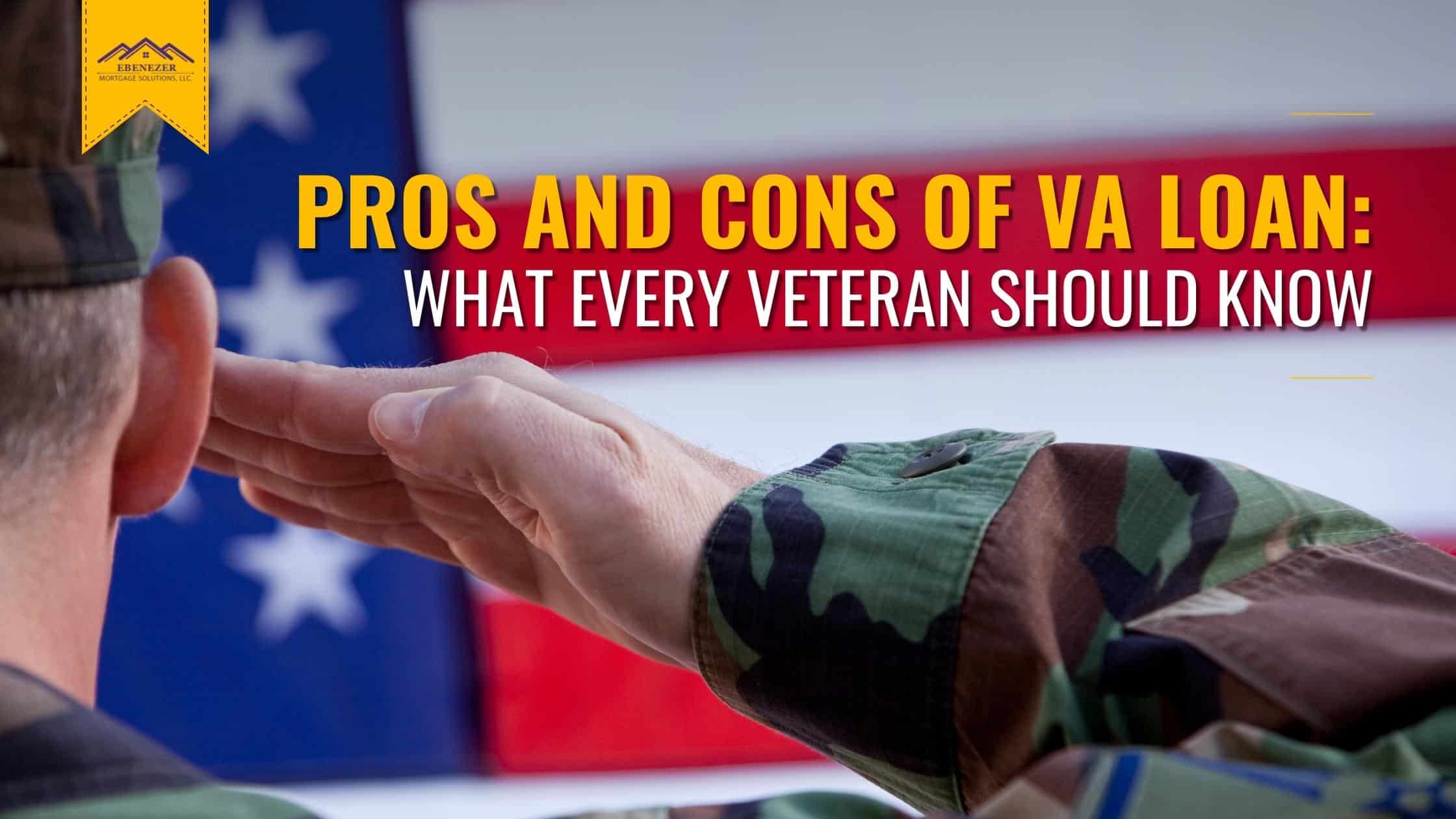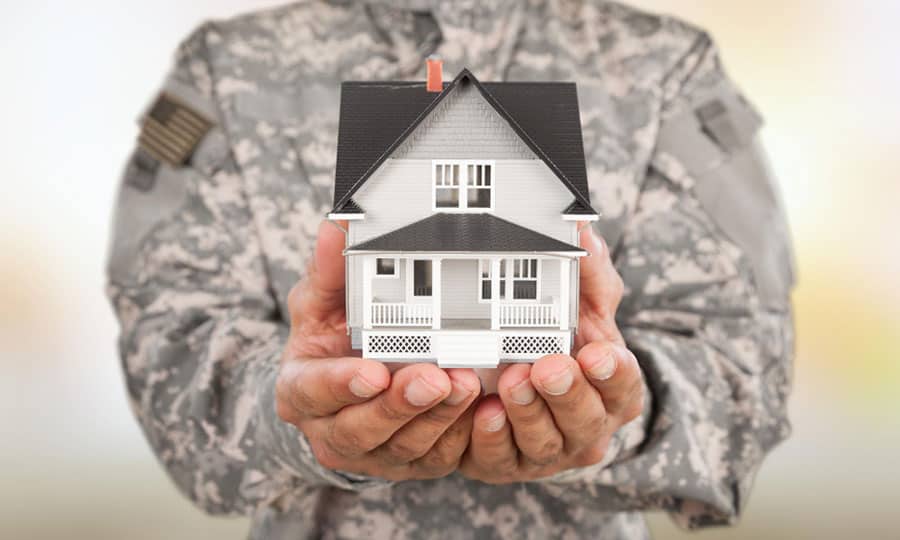Your Most Trusted Partner in Home Purchase Loans & Refinance Loans
Open Hours: Mon. - Fri., 9:00 a.m. - 6:00 p.m.

A VA loan is one of the most attractive mortgage products on the market. It creates a fair playing field for veterans and military members, allowing them to achieve the dream of homeownership. However, just like any other mortgage product, VA loans come with their own advantages and disadvantages.
In this blog, we're going to discuss what a VA home loan is and its pros and cons. Read on to learn more about this mortgage product and decide whether it's the right home loan for you.
A VA loan is a mortgage backed by the U.S. Department of Veterans Affairs (VA). But even though it's guaranteed by the VA, the actual mortgage product is issued by VA-approved lenders.
The VA guarantees up to 25% of loans higher than $144,000 or 50% if the mortgage amount is just $45,000 or smaller. This guarantee allows lenders to offer more favorable terms and rates to eligible borrowers compared to other mortgage products in the market.
Although VA loans sound like a great mortgage option, they are not for everyone. VA loans are only available to eligible veterans, active-duty military members, and their surviving spouses. To qualify for a VA loan, you must fulfill at least one of the following:

Now that you have an idea of what a VA loan is, let's discuss its advantages and disadvantages. Let's start off with some of the more notable VA loan pros.
Probably the biggest selling point for VA loans is that they do not require a down payment. For most people, a down payment can be a hindrance in home buying. It takes years before they can save enough funds for a down payment.
Conventional loans typically require a 20% down payment. But if you're a first-time homebuyer, you can put in as low as a 3% down. With FHA loans, you can put in a 3.5% down payment if your credit score is 580 or higher.
However, this still means that you need thousands of dollars to start your homebuying process. Moreover, the purchase price in the housing market is constantly increasing. This means that the required down payment amount is also increasing. But for VA borrowers, home buying might be somewhat easier as they don't need to shell out cash for a down payment.
Nonetheless, it's important to note that there are cases where a VA borrower needs to pay a down payment. An example of such cases is when the sales price of the property is higher than its appraised value, you'll need to make a down payment to cover the difference. Another one is if you have reduced VA entitlement, you're also likely to pay a down payment.
With conventional mortgages, if the borrower is not able to contribute a 20% down payment, they would have to pay for Private Mortgage Insurance (PMI). FHA loans also have their own Mortgage Insurance Premium (MIP), which you have to pay for the life of the loan.
These mortgage insurances are meant to protect the mortgage lenders if ever the borrower defaults on the loan. But with a VA loan, even if you didn't put in any down payment at all, you won't have to pay for mortgage insurance.
Another benefit of being guaranteed by the federal government is that mortgage lenders are more likely to issue lower rates for VA loans. VA rates are typically 0.25% – 0.42% lower compared to conventional rates. With a lower interest rate, borrowers will be able to save more money in the long run.
VA closing costs typically range from 3% to 5% of the purchase price. But unlike traditional closing costs, VA loans' closing costs have perks that make the expense not too heavy on the pockets.
As the buyer, you'll have to take responsibility for the loan origination fee, VA funding fee, title insurance and other costs. But one of the advantages of a VA loan is that a VA-approved lender cannot charge you more than 1% for the origination fee. The origination fee is the cost needed to process the loan.
A VA loan also has non-allowable fees. These fees are costs that lenders cannot demand you to pay. Non-allowable fees include attorney fees, real estate agent fees and payment for appraisals requested by the lender. The lender themselves might have to cover these costs.
Another perk of a VA loan is that you can ask the seller to pay up to 4% of the closing costs. They might not agree to do it, but you can definitely ask during negotiations.
Additionally, with a VA loan, you can opt to have the VA funding fee rolled into the total mortgage amount. This can help lessen the out-of-pocket cash you need to pay upon closing.
Your credit score might not be a major factor for the VA. But it is important for a mortgage lender along with other financial requirements.
Nonetheless, the VA allows for a higher debt-to-income (DTI) ratio. Generally, mortgage lenders require a DTI of 36% or lower. But with a VA loan, you can have a DTI of no greater than 41%. Still, some lenders might even accept a DTI higher than that.
When it comes to refinancing, the VA home loan program has two options to choose from. First is the VA Cash-Out Refinance where borrowers can turn 90% of their home equity into cash. They can then use this money to consolidate debt, renovate the house, or for any other needs.
The second one is the Interest Rate Reduction Refinance Loan (IRRRL), also known as the VA Streamline Refinance. This refinance option can help veteran homeowners easily change their mortgage terms, lower interest rates, or switch from an adjustable to a fixed-rate mortgage. It is called 'streamline' because it often requires less paperwork since you're only refinancing from one VA loan product to another.
For a traditional mortgage, you can be eligible four years after a Chapter 7 bankruptcy and two years if it's a Chapter 13. With a VA loan, the waiting period is just half of those.
VA loan borrowers will only need to wait two years after a Chapter 7 bankruptcy, foreclosure or short sale. And for a Chapter 13 bankruptcy, you'll only need 12 months after on-time payments.
Moreover, the VA also offers assistance to borrowers to help them avoid foreclosure. This is because the goal of VA home loans is not only to get veterans into homes but also to keep them there.

Just like any other loan program, VA home loans have some potential disadvantages. Here are some of the cons of VA loans.
VA loans require a funding fee. This fee is charged to help keep the VA loan program running for future generations. The amount you'll pay will depend on the down payment you put in. If you put in less than 5% down, you'll have to pay a funding fee of 2.3% of the total loan amount. Additionally, this fee might increase the second time you use a VA home loan. The funding fee can be paid upon closing or rolled into your mortgage.
All properties that will be bought with a VA home loan will have to undergo a VA appraisal. This appraisal is meant to check if the condition of the property is safe and sound for the homebuyer. However, most borrowers find the appraisal too strict. Especially if they are considering an older property that needs a renovation.
If you're thinking about buying a second home or an investment property, then a VA loan is not for you. VA loans can only be used on primary residences where the borrower intends to live full-time. However, it might be possible to purchase a multi-unit property where you use one unit as your primary residence and then rent out the other units.
Some sellers are not inclined to accept a purchase offer made with a VA loan. They often have this misconception that VA home loans take a long time to process and are just a hassle to the seller. It might also be difficult for the buyer to make the offer attractive to the seller since you can't waive certain contingencies such as VA appraisals.
Now that you have an idea of the pros and cons of VA loans, it's time to consider whether it's the right mortgage option for you. If you're not sure yet, Ebenezer Mortgage Solutions is here to help.
Ebenezer Mortgage Solutions is a mortgage broker in Tampa. We work with a large network of lenders including the ones that offer a VA loan in Tampa. We can process the application with multiple lenders so that you don't have to. And then with our experience and knowledge, help you decide which one suits you best.
If you're ready to become a homeowner, Ebenezer Mortgage Solutions is ready to help you. Call us today at (813) 284 - 4027 so we can start working on getting your dream home.
